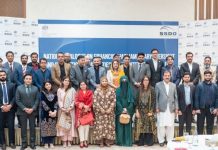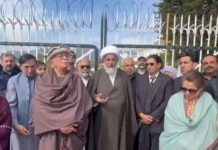DNA
KARACHI: Ambassador of European Union (EU) Raina Kionka has said that rather than staying confined to exporting textiles only, the business community of Karachi should broaden and diversify their exports to EU so as to take maximum advantage of EU’s GSP Plus for Pakistan which has recently been rolled over for four more years up to 2027.
“GSP Plus is tremendously important for Pakistan’s economy whose overwhelming beneficiaries are not just textile producers but by trickledown effect, all those people as well who work in textile factories. GSP Plus has been extremely positive and useful in economic terms during the last 10 years as it helped in increasing Pakistan’s exports to EU by 108 percent while EU imports also ascended by 40 percent since the start of this program”, she added while exchanging views at a meeting during her visit to Karachi Chamber of Commerce & Industry (KCCI).
President KCCI Iftikhar Ahmed Sheikh, Senior Vice President Altaf A. Ghaffar, Vice President Tanveer Ahmed Barry, Chairman Diplomatic Missions & Embassies Liaison Subcommittee Farooq Afzal, Trade Advisor EU Delegation to Pakistan Hasnain A. Iftakhar and KCCI Managing Committee Members were present on the occasion.
Raina Kionka further stated that EU’s GSP Plus for Pakistan has been rolled over without any changes to the rules framework so everything was going to stay the same up to 2027. “We also have elections in June 2024, which means there will be political changeover in the Parliament and the EU’s Commission. Once everything settles, we expect that the new Parliament and the council of EU member states will once again take up negotiations on a new directive for GSP Plus with Pakistan which couldn’t happen last year. Although it’s a four-year rollover for GSP Plus but if they come up with a new regulation, it will become effective before 2027.”
While identifying Gems and Jewelry, Tourism, Handcrafts and Auto Parts etc. as potential sectors under GSP Plus, the EU Envoy noted that 28 percent of Pakistan’s exports come to European single market which was a good number but it could be lot bigger which was one of the main things EU Delegation in Islamabad has been working on so that Pakistan’s exports could be enhanced through better utilization of GSP Plus, diversifying exports, investing in value-addition, using new technologies & IT solutions for better access to EU Market, besides bringing in the SMEs who are the backbone of any economy.
She informed that EU’s delegation in Islamabad would also like to set up a platform to promote EU-Pakistan business-to-business relations which could also help the SMEs in making good connections with businesses in EU and ultimately help the SMEs in Pakistan to also benefit from GSP Plus. “Gems and Jewelry sector of Pakistan has huge potential so they must add value here and export them to the European Union rather than exporting the raw material around the region and have somebody else doing all the cuttings, polishing and making jewelry”, she added while asking why it cannot be done here in Pakistan?
Earlier, President KCCI Iftikhar Ahmed Sheikh, while welcoming EU’s Ambassador, pointed out that in addition to being a major trading partner of Pakistan, it was really encouraging to see that the EU has been supporting Pakistan’s integration into the global economy while Pakistan was committed to fortify enduring, future-oriented and comprehensive partnerships for peace, development, and prosperity with the European Union.
He noted that the EU has been the largest export destination for Pakistan, which stood at $8.4 billion, followed by USA at $5.93 billion and China at $2.02 billion in FY23. “Pakistan’s exports to EU are dominated by textiles sector which is the backbone of Pakistan’s exports. Last year, Pakistan’s total textile exports remained at $16.50 billion which is almost 60 percent of the total exports.”
He stressed that sustainable polices were needed in Pakistan during its journey to economic recovery which would also pave way to exploit the full potential of EU’s GSP plus and attract much-needed Foreign Direct Investment. Pakistan and EU need to discuss ways to improve access of Pakistani products in the EU market, address trade barriers, foster collaboration, focus on export diversification, ensure smoother trade practices and compliance with international standards.
Iftikhar Sheikh also underscored the need for skill development and capacity building initiatives to enhance competitiveness of Pakistani businesses in the international market, besides taking steps for technology transfer, knowledge-sharing and encouraging public-private partnerships.
He also requested the EU Ambassador to arrange a business delegation for participation in KCCI’s My Karachi-Oasis of Harmony International Exhibition scheduled to be staged in August 2024, which always attracts immense participation of international and national exhibitors.

















